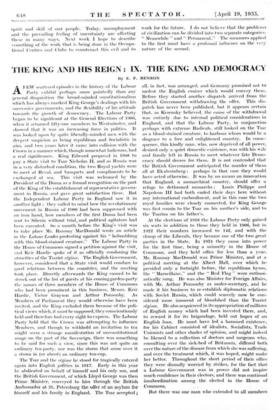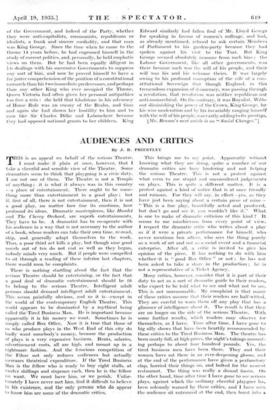THE KING AND HIS REIGN : IX. THE KING AND
DEMOCRACY
By E. F. BENSON
AFEW scattered episodes in the history of the Labour Party exhibit perhaps more pointedly than any general disquisition the broad-minded constitutionalism which has always marked King George's dealings with his successive governments, and the flexibility of his attitude towards the growth of democracy. The Labour Party began to he significant at the General Elections of 1906, when it returned fifty-one members to Westminster, and showed that it was an increasing force in politics. It was looked upon by quite liberally-minded men with the deepest suspicion as being republican and Socialistic in aim, and two years later it came into collision with the Crown in a manner which, though somewhat ludicrous, had a real significance.- King Edward proposed in 1908 to pay a State visit to Tsar Nicholas II, and as Russia was in a very disturbed condition, the two Royal yachts were to meet at Real, and banquets and compliments to be exchanged at sea. This visit was welcomed by the President of the Duma as a formal recognition on the part of the King of the establishment of representative govern- ment in Russia, and gave great satisfaction there. But the Independent Labour Party in England saw it in another light : they called to mind how the revolutionary movement in Russia of 1906 had been suppressed with an iron hand, how members of the first Duma had been sent to Siberia without trial, and political agitators had been executed. So a month before the King's visit was to take place Mr. Ramsay MacDonald wrote an article in the Labour Leader protesting- against his " hobnobbing with this blood-stained creature." The Labour Party in the House of Commons signed a petition against the visit, and Keir Hardie spoke of it as officially condoning the atrocities of the Tsarist regime. The English Government, however, considered that a State visit would conduce to good relations between the countries, and the meeting took place. Directly afterwards the King caused to be struck out of the list of guests at his cominggarden-party the names of three members of the House of Commons who had been prominent in this business, Messrs. Keir Hardie, Victor Grayson and Arthur Ponsonby. As Members of Parliament they would otherwise have been invited, and the King excluded them because of the poli- tical views which, it must be supposed, they conscientiously held and therefore had every right to express. The Labour Party held that the Crown was attempting to influence Members, and though to withhold an invitation to tea. might seem a strange manifestation of unconstitutional usage on the part of the Sovereign, there was something to be said for such a view, since this . was not quite an ordinary tea-party, nor was the storm that arose over it a storm in (or about) an ordinary tea-cup.
The Tsar and the regime he stood for tragically entered again into English politics in 1917. Early in this year -he abdicated on behalf of himself and his only son, and the British Government, of which Lloyd George was then Prime Minister, conveyed to him through the British Ambassador at St. Petersburg the•offer- of an asylum for himself and his family in England.- The Tsar accepted ; all, in fact, was arranged, and Germany promised not to molest the English cruiser which would convey them. Before they started another dispatch arrived from the • British Government withdrawing the offer. This dis- patch has never been published, but it appears certain that, as Kerensky believed, the cause of the withdrawal was entirely due to internal political considerations in England, and that the Labour Party, in conjunction perhaps with extreme Radicals, still looked on the Tsar as a blood-stained creature, to harbour whom would be a disgrace to a free and enlightened country. In conse- quence, this kindly man, who, now deprived of all power, desired only a quiet domestic existence, was with his wife and family left in Russia to meet whatever fate Demo- cracy should- decree for them. It is not contended that the British Government anticipated the murder of them. all at Ekaterinberg : perhaps in that case they would have acted otherwise. It was by no means an innovation that England, a monarchical country, should offer a refuge to dethroned monarchs : Louis Philippe and Napoleon III had both ended their days here without any international embroilment, and in this case the two royal families were closely connected, for King George• was first cousin to the Tsar on his mother's side, and to the Tsarina on his father's.
At the elections of 1918 the Labour Party only gained. six seats in addition to those they held in 1906, but in 1922 their numbers increased to 142, and with the slump of the Liberals, they became one of the two great parties in the State. In 1924 they came into power for the first time, being a minority in the House of Commons, and they held office for less than a year. Mr. Ramsay MacDonald was Prime Minister, and at a political fleeting at the Albert Hall, over which he presided only a fortnight before, the republican hymn, the " Marseillaise," and the " Red Flag " were enthusi- astically sung. He was also Minister for Foreign Affairs, with Mr. Arthur Ponsonby as under-secretary, and he made it his business to re-establish diplomatic relations with Soviet Russia, which could scarcely now be con- sidered more innocent of bloodshed than the Tsarist regime. He also acquiesced in its appropriation of millions of English money which had been invested there, and, to reward it for its brigandage, held out hopes of an English loan. He must have led. a harassed existence, for his Cabinet consisted of idealists, Socialists, Trade Unionists. and other shades of opinion, and might indeed be likened to a collection of doctors and surgeons who, consulting over the sick-bed of Britannia, differed both over the nature of the disease from which she was suffering, and over the treatment which, it was hoped, might make her better. Throughout the short period of their office they were dismally worried by strikes, for the fact that a Labour Government was in power did not inspire much confidence in their electors, and there was continual insubordination among the elected in the House of Commons.
But there was one man who extended to all members of the Government, and indeed of the Party, .whether they were anti-capitalists, communists, - republicans or idealists, a frank and 'sincere cordiality, and that man was King George. Since the time when he came to the throne 14 years before, he had engrossed himself in the study of current politics, and, personally, he held emphatic views on them. But he had been equally diligent in his dealings with his successive Governments to suppress any-"sort of hid, and now he'proved hiniself to have a far juster comprehension of the position of a constitutional monarch than his two immediate predecessors, and perhaps than any. other King who ever occupied the Throne. Queen Victoria had often given her personal antipathies too free a. rein : she held that Gladstone in his advocacy of Home. Rule was an enemy of the Realm, and time and again she had shown her hostility to him and to men like. Sir Charles Dilke and Labouchere because they had: opposed national grants to her children. King Edward similarly had fallen foul of Mr. Lloyd George for speaking in favour of women's suffrage, and had, as already, mentioned, refused to ask certain Members of Parliament to his garden-party because they had spoken against his visit to the Tsar.. But King George seemed absolutely immune from such bias ; the Labour Government, like all other governments, was there because such was the will of his people, and their will 'was his and his welcOme theirs. It 'was largely owing to his profound conception of the role of a con- stitutional Sovereign that though England, in this tremendous expansion of democracy, was passing-through a revolution, that revolution was neither .republican: no anti-monarchical. On the contrary, it was Royalist. With- out diminishing the power of the Crown, King George, by his wise moderation and by his invariably ranging himself . with the will of his people, was vastly adding to its prestige.
[Mr. Benson's next article is on "Social Changes."j







































 Previous page
Previous page